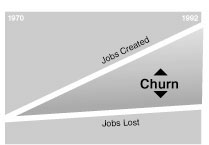ALL FLUX
But the network economy has moved…
…from change to flux.
Change, even in its shocking forms, is rapid difference. Flux, on the other hand, is more like the Hindu god Shiva, a creative force of destruction and genesis. Flux topples the incumbent and creates a platform for more innovation and birth. This dynamic state might be thought of as “compounded rebirth.” And its genesis hovers on the edge of chaos.
Donald Hicks of the University of Texas studied the half-life of Texan businesses for the past 22 years and found that their longevity has dropped by half since 1970. That’s change. But Austin, the city in Texas in which new businesses have the shortest expected life spans, also has the fastest-growing number of new jobs and the highest wages. That’s flux.

The number of old jobs lost increases, but not as fast as the number of new jobs created. More important, the spread of gained jobs over lost jobs widens.
Hicks told his sponsors in Texas that “the vast majority of the employers and employment on which Texans will depend in the year 2026–or even 2006–do not yet exist.” In order to produce 3 million new jobs by 2020, 15 million new jobs must be created in all, because of flux. “Rather than considering jobs as a fixed sum to be protected and augmented, Hicks argued, the state should focus on encouraging economic churning–on continually recreating the state’s economy,” writes Jerry Useem in Inc., a small-business magazine that featured Hick’s report. Ironically, only by promoting flux can long-term stability be achieved.

